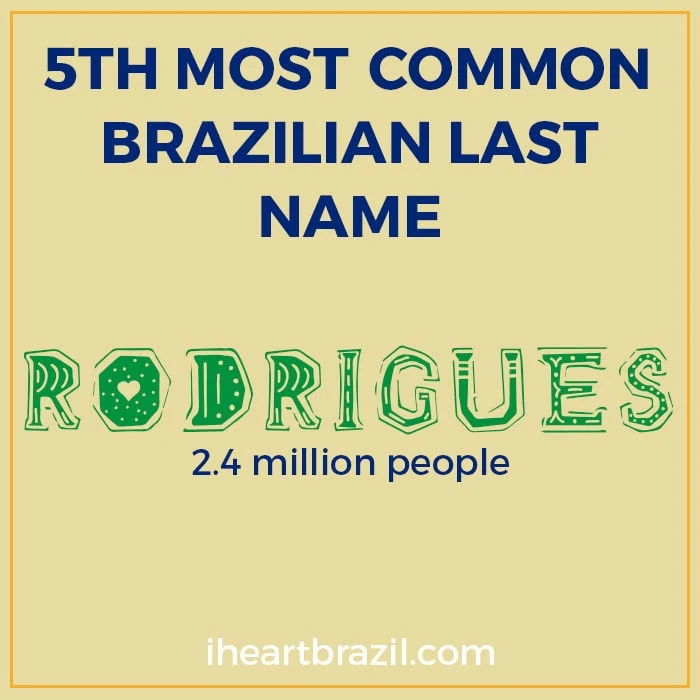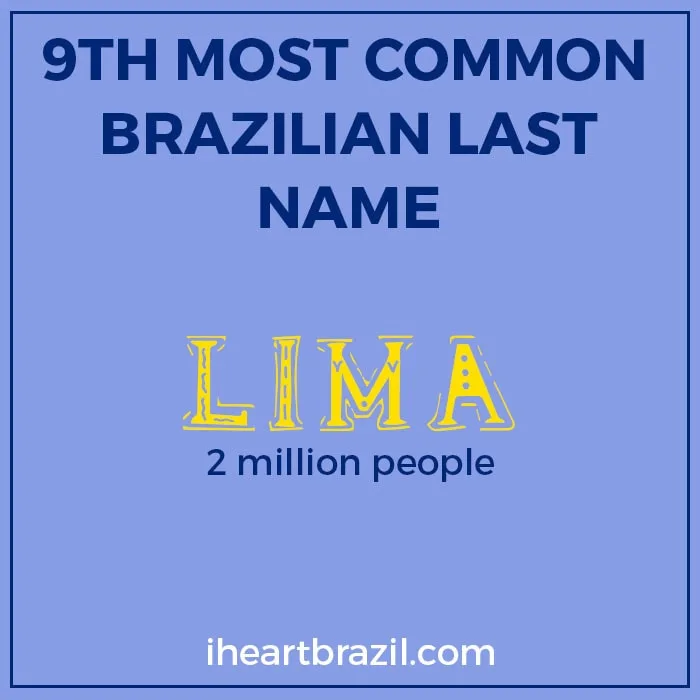This interesting list of Brazilian last names will deepen your understanding of our origins and traditions.
What’s your last name? The answer to this question says a lot about your origins.
It can give up precious information about where your ancestors used to live or do for a living.
In today’s article, I will talk about the Brazilian last names and their interesting meanings.
Beyond that, I will also discuss what kinds of last names we use more often in the country and give you a massive list with the 100 most common surnames in Brazil.
Let’s get to them!

Brazil last names
As I mentioned earlier, your last name can say a lot about your origins, and that’s exactly what I will talk about today.
First and foremost, last names were created to identify people more easily. That was its use when someone first had the idea to give people second names.
If you didn’t know that, now you do. Good!
Now, fast forward a few centuries to 1500, when the Portuguese came to Brazil.
Back then, they had no idea how to organize and identify the local inhabitants, the Brazilian Indigenous people, as they did not have or need last names.

So the Portuguese came up with the brilliant idea of installing a new name convention in the country.
That’s why many Brazilian last names are actually Portuguese names. It is a story that goes back to the colonization period.
So as to avoid more confusion, people were given last names based on their profession, marriage, place of birth, or on their parents or former owner’s name (for slaves), among other reasons.
Besides, with a massive influx of European immigrants in recent centuries, many Brazilian names have Italian, German, and Spanish roots too.
Let’s talk about some of these different types.

Last names in Brazil
These are the most common types of Brazilian last names.
Matronymic and patronymic last names
Last names in Brazil were passed on from father to son and from mother to daughter.
But instead of using the literal surname, many times, the name had a modification indicating how the person had earned it.
For instance, Antunes (son of Antônio, one of the most popular Brazilian boy’s names), Fernandes (son of Fernando), Joana Fernanda (daughter of Fernanda), and Rodrigues (son of Rodrigo) are matronymic/patronymic last names that are made from the father or mother’s name.
The addition of the suffix -es would mean “son of,” but that wasn’t used in every case, though.

On a side note, slaves were not allowed to have a last name, so many African slaves–not the Indigenous Brazilian–had to give up their family names.
That’s the reason it is rare to find African surnames in Brazil nowadays.
However, many freed slaves incorporated their last former owners’ surnames as soon as they were allowed to.[1]
In that case, the naming convention would be their first name followed by a possessive preposition (da, de, or do) and their new last names.
Say a freed slave named Ubiratan whose last owner was José da Silva, Ubiratan would then register his new name as Ubiratan da Silva.

Toponymic last names (of geographical origin)
Some Brazilian last names were given based on the geographic origins of each individual.
For instance, Ribeiro was used by people who lived near rivers, Costa was used by people born near the coast, and Silva was used by people who lived in or near a forest.
Fun fact: A little more than 6 million people in Brazil are named Silva, making it the most common Brazilian last name.
In Latin, Silva is the word for forest, which is why it was given to people who worked/lived in those places.

Last names by profession
The last names could also be given based on the person’s occupation.
So a person named Machado, the Brazilian Portuguese word for axe, would probably be this object’s manufacturer.
Someone named Ferreira, the Brazilian Portuguese word for workshop, would probably work in such a place.

Appellative last names
Sometimes, last names in Brazil were given based on physical characteristics or personal attributes.
For instance, a person named Moreno was probably dark-skinned as moreno is the Portuguese word for dark-skinned brunette.
Religious last names
In countries with a strong religious influence, such as Portugal, Italy, and Spain, it was common to adopt religious designations, and that also applied to Brazil.
Because of that, we have many religious last names, mostly catholic, such as Anjos (English: Angels), Assunção (Assumption), Batista (Baptist), Santiago (Saint Iago), Trindade (Trinity), and Graça (Grace, which also is one of the most popular Brazilian girl’s names).

Other common Brazilian last names and their meanings
- Alves or Álvares – son of Álvaro.
- Santos – religious last name given to people born on November 1st, All Saints’ Day or at the Bay of All Saints, today known as Salvador, Bahia.
- Oliveira – someone who owned or was born in a place with many olive trees.
- Souza – someone who owned or was born in a place with many rocks as Souza comes from the Latin word saxa.
- Pereira – someone who owned or was born in a place with many pear trees.
How do Brazilian last names work?
For the most part of Brazil’s history, people had only one last name.
The adoption of a second name came with a massive increase in the population some time later.
Nowadays, the convention says every citizen born in Brazil has a first name plus at least one last name, but usually two.
The first surname comes from the mother and the second from the father.

So if Maria Ribeiro Carvalho would have a child with Ronaldo Silva Assunção, their child would hypothetically be named Francisca Carvalho Assunção.
Note that only the last names from both parents are given to the newborn, so every citizen usually has two surnames.
When couples get married in Brazil, the woman often adds her husband’s last name, so using the example above, it would be Maria Ribeiro Carvalho Assunção.
On a different note, when a boy is named after his father, he is given the name Junior after his last surname.
For instance, the Brazilian soccer player Neymar da Silva Santos Junior is named after his father, who is also named Neymar.
When a boy is named after his grandfather, he is given the name Neto after his last surname. Neto means grandson in the Portuguese language.

What are the most common last names in Brazil?
These are the top 10 Brazilian surnames that account for 15.5% of the country’s population.
| Rank | Brazilian Last Name | People |
|---|---|---|
| 1 | Silva (and variations, such as da Silva) | 6.2 million |
| 2 | Santos (and variations, such as dos Santos) | 5 million |
| 3 | Oliveira (and variations, such as de Oliveira) | 4.3 million |
| 4 | Souza | 2.6 million |
| 5 | Rodrigues | 2.4 million |
| 6 | Ferreira | 2.4 million |
| 7 | Alves | 2.2 million |
| 8 | Pereira | 2.2 million |
| 9 | Lima | 2 million |
| 10 | Gomes | 1.6 million |
These are the 11-100 most common Brazilian last names
- Costa
- Ribeiro
- Martins
- Carvalho
- Almeida
- Lopes
- Soares
- Fernandes
- Vieira
- Barbosa
- Rocha
- Dias
- Nascimento
- Andrade
- Moreira
- Nunes
- Marques
- Machado
- Mendes
- Freitas
- Cardoso
- Ramos
- Gonçalves
- Santana
- Teixeira
- Araújo
- Conceição
- Bezerra
- Campos
- Reis
- Melo
- Moraes
- Borges
- Castro
- Monteiro
- Moura
- Miranda
- Garcia
- Duarte
- Medeiros
- Barros
- Aparecido
- Pinto
- Pinheiro
- Leite
- Correia
- Nogueira
- Henrique
- Tavares
- Coelho
- Pires
- Paula
- Jesus
- Cruz
- Guimarães
- Carmo
- Viana
- Silveira
- Brito
- Neves
- Carneiro
- Cordeiro
- Farias
- Dantas
- Assis
- Braga
- Siqueira
- Macedo
- Antunes
- Maciel
- Cunha
- Fonseca
- Menezes
- Maia
- Lemos
- Barreto
- Magalhães
- Chaves
- Lourenço
- Azevedo
- Matos
- Torres
- Queiroz
- Domingos
- Mota
- Sales
- Simões
- Cabral
- Sampaio
- Amaral
Brazilian surnames
Most names on this list have their origins in European countries, such as Portugal, Spain, or France.
However, there are considerable large Italian, German, Japanese, and obviously western African communities in the country.
Brazil is a diverse country even though people’s last names mostly point to a single region of the world.
Did you like this massive list with Brazil last names? Then share it with someone who might like it too!
